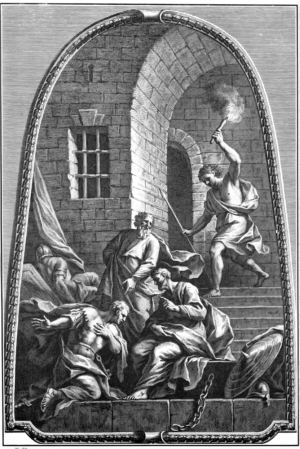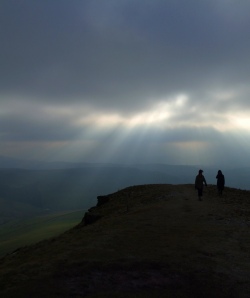"’Conozcamos, pues, esforcémonos por conocer al SEÑOR. Su salida es tan cierta como la aurora, Y El vendrá a nosotros como la lluvia, como la lluvia de primavera que riega la tierra.’"
(Oseas 6:3 NBLH)
"’Let us know; let us press on to know the LORD; his going out is sure as the dawn; he will come to us as the showers, as the spring rains that water the earth.’"
(Hosea 6:3 ESV)
Once again there’s a lot more here than meets the eye. It seems to me that to know the LORD is more than just to know who He is.
You know the old expression, to know him is to love him. In this case, knowing the LORD means acknowledging Him – recognizing who He really is.
In refusing to let the people of Israel go, Pharaoh said, "Who is the LORD, that I should obey his voice and let Israel go? I do not know the LORD, and moreover, I will not let Israel go." (Exodus 5:2)
The ruler of Egypt knew the claims that Moses made about God, but he didn’t recognize God’s authority.
God promises that someday they shall not teach, each one his neighbor and each one his brother, saying, ‘Know the Lord,’ for they shall all know Me, from the least of them to the greatest. (Hebrews 8:11)
Hosea calls the people over and over to know the Lord, to repent, to return to Him, and experience His healing.
In chapter 4 he writes:
Hear the word of the LORD, O children of Israel, for the LORD has a controversy with the inhabitants of the land. There is no faithfulness or steadfast love, and no knowledge of God in the land; there is swearing, lying, murder, stealing, and committing adultery; they break all bounds, and bloodshed follows bloodshed…
My people are destroyed for lack of knowledge…
And later in chapter 6 he says: For I desire steadfast love and not sacrifice, the knowledge of God rather than burnt offerings.
This knowledge is a recognition of who God is – and the natural response – repentance, and thankfulness for His forgiveness and healing. Do you notice how, in both of these passages, love is parallelled with knowledge? They’re not opposites – they’re intertwined.
We must get back to the topic of the resurrection, which we touched on yesterday. Even in the early days of the church the connection was made between this verse and the resurrection. After the mention of the third day in verse 2, the going forth of the Lord is as sure as the dawn. Of course, early in the morning, Jesus did go forth from the tomb.
I still say we shouldn’t be hasty to make a direct connection here to the resurrection. But the Lord’s triumph on resurrection Sunday was certainly the start of something. Something that Hosea longed to see.
Jesus’ triumph over the grave was the beginning of the end of sin and death and pain. He then ascended into heaven and poured out the Spirit – another important coming.
And Jesus will come again, to put all wrongs right.
This is then, I think, a verse that can be applied to the small things, and the big things.
The small things are like when we return to the Lord, when we repent and seek Him in His Word, and He brings forgiveness and healing. Or when He meets us in our difficult circumstances. See Lamentations 3:22-23.
And the big things are things like – well, the thing – when He returns.
Jesus will come to us, with healing, with love, and with forgiveness. There’s no doubt. It’s as sure – more sure – than the regular seasons of the earth, or the sunrise itself. In fact, Jesus calls Himself the morning star – the first sign that a new day is dawning.
Our sorrows can only be temporary.
"I, Jesus, have sent my angel to testify to you about these things for the churches. I am the root and the descendant of David, the bright morning star."
The Spirit and the Bride say, "Come." And let the one who hears say, "Come." And let the one who is thirsty come; let the one who desires take the water of life without price.
…He who testifies to these things says, "Surely I am coming soon." Amen. Come, Lord Jesus!
(from Revelation 22:16-21)


